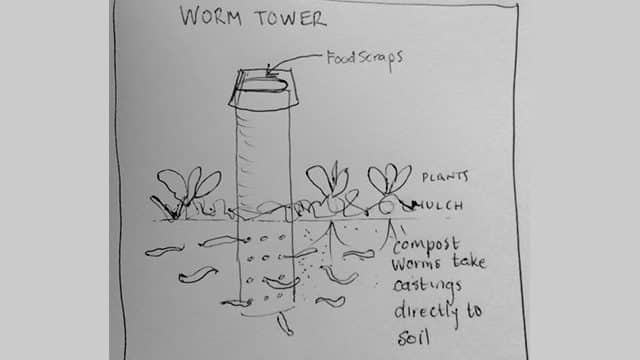Australian’s typically throw away 20% of the food they buy – that’ one out of every 5 shopping bags full. In one year, Australian’s waste $8 billion of food. Sadly much of this food waste ends up in our bins. I was appalled to hear that up to 40% of our garbage bins are filled with food. The financial, social, and environmental costs of this are high.
My boys are starting to get bigger now, so I don’t often have leftovers at the dinner table. Leftovers however don’t ever go to waste – they are lunch the next day or incorporated somehow into the next dinner. Every single scrap from my kitchen is in high demand. I separate the food scraps – some for the chooks, some for the compost, and some for the worms.
There are lots of ways to easily process food scraps into compost, but the easiest way I know, for even the most squeamish and reluctant gardeners is, to turn the food scraps into fertile garden soil using a worm tower.
The bonus of worm towers is that they don’t require turning, digging, or actually any need for handling the worms and castings. The worms process the scraps and take their casting directly to the roots of the plants. A worm tower is a simple way to improve fertility without double handling – the worms do the work where you need them to be.
I space my worm towers about 3 metres apart. They are excellent too in raised garden beds. It is important to put in a few handfuls of compost worms (blue, red, tiger worms) into the tower to really get the system powering.
Our three worms towers receive a bundle of food every couple of weeks. I always add a couple of handfuls of mulch or shredded paper on top to prevent flies, then replace the lid (an upturned pot). I also regularly add coffee grounds.
 |
| A newly installed worm tower. |
 |
| Worm towers work well too in herb gardens |
- check the cupboard before going shopping
- use leftovers
- keep a good list
- don’t shop when you’re hungry
- try not to cook too much



What a brilliant idea. I could use a couple in my allotment, just move a some worms over from the main community worm farm.
I love this! Thanks for sharing, this is definitely going to happen in my garden 🙂
I'm just writing about the exact same thing for a talk i'm doing on improving your soil.
Fabulous! I hope your talk goes really well. I've often included worm towers, and how to make them, in talks and workshops I do about soil and maintaining healthy gardens. They just make so much good sense. 🙂
What foods can you add? And what foods are not suitable? Meat? Fish? Eggs? Pasta/cereals? Risk of wildlife or domestic pets taking an interest? Thinking about this a extra alongside a standard compost heap that can only take fruit and veg peelings, tea bags and coffee grounds. Thanks, Nick
Anything you normally put in a worm farm is suitable – so avoid meat, fish, eggs, lots of onion and citrus. A great system that can take all these things is the Bokashi Bin. I'll write a piece on this very soon.
You don't need to because they'll be getting water from the soil around. However it wouldn't hurt to put the hose down every now and then.
Do you need to add extra water to these towers like you do to worm farms? Like the once a week flush of water for example?
Hi, sounds like you need to water it a bit and make sure you add some compost worms down the hole too. Good Luck!
When we tried this in our vegie garden, the compost didn't break down. Months later it was still sitting. Any ideas why this would happen?
Hi! I love your inspiring website and the many useful tips about how to make yourself things like toothpaste or washing powder, which I was looking for on the Internet. I just made a (low) worm tower, and was looking for an idea to make a lid and well, an up turned pot is doing super good… So many thanks and hope to read more:)
Yes – every now and then I will add some water to make sure the materials inside are all moist. But usually the water from the surrounding garden seems enough to keep it moist.
I put one in for a 'client' (friend who pays me to garden) the other day. Do you tend to water yours every now and then (inside the worm tower) Morag?
What size is your tube, and is it a PVC tube? thanks, jackie
I use buckets to make my worm towers, and then every so often place another bucket on top to entice the worms upwards into "fresh" food. This means I can harvest the worm castings left in the bucket.
That's a great idea.
The pipe is 150mm diameter.
Morag what size is your pvc pipe please…you dont give any size…bit hard to see from the video…awesome by the way.